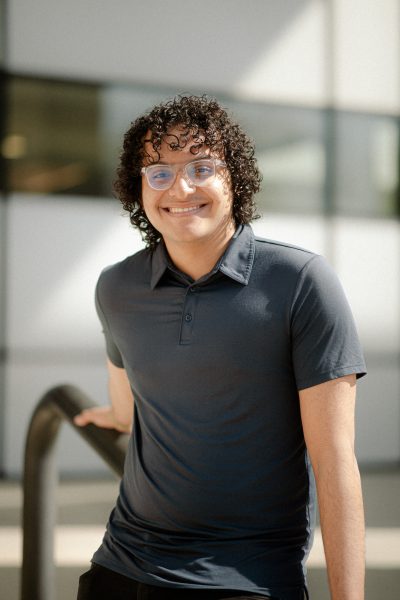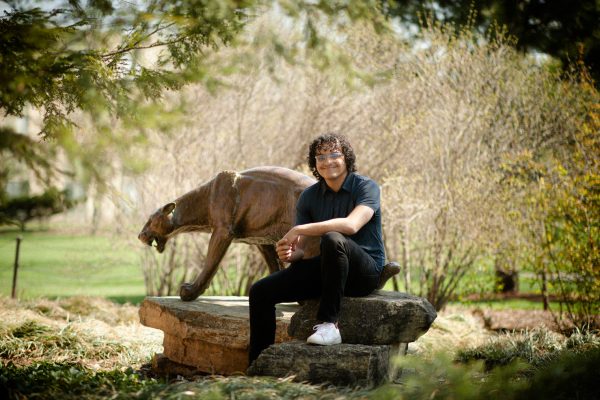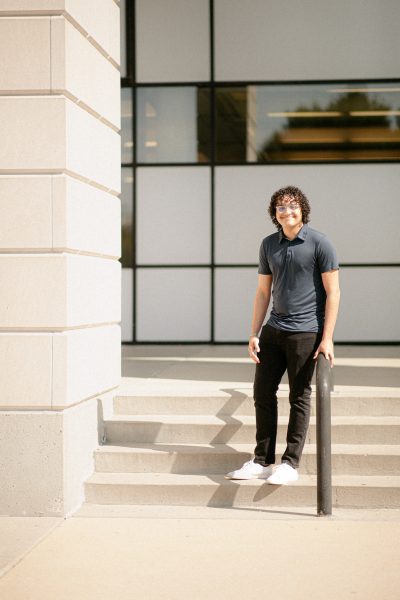Something new every day
Author: Stacey Maifeld
Author: Stacey Maifeld

When asked for his best advice for new students, graduating senior Félix Báez-Santiago (’23 data science, statistics) issues one simple challenge.
“Get out of your room,” he said. “Do something new every day. Explore a new building. Go to a random club to meet people. Get involved with as many things as you can and as your schedule allows.”
It’s the advice he took to heart throughout his time as a Cyclone – and it paid off. Báez-Santiago’s passion for pursuing new opportunities led him to present research at the world’s largest conference of forensic scientists in Nashville, plant trees in New Orleans during alternative spring break, teach a class as a peer mentor, intern with a competitive summer program, enjoy campus Recreation Services, and even spend a semester with Air Force ROTC.
As he looks to the future, he plans to use his spirit of curiosity to make a positive impact.
“I would love to combine my data skills and my interest in human-related issues and work with data for Puerto Rico,” he said.
Growing up in Quebradillas, Puerto Rico, a small coastal town in the northwestern part of the island, Báez-Santiago was interested in attending college in the U.S. mainland. But he was still determining where that would be when his childhood friend, who was already a Cyclone, told him about Iowa State.
Báez-Santiago applied, visited, and immediately liked Iowa State’s campus and atmosphere. Once he moved to Ames to begin college, the APEX program ensured his college experience got off to a great start – with plenty of new things to try.
“Living with 60 other multicultural students in Buchanan Hall was amazing,” Báez-Santiago said. “It was a perfect transition from high school to college life in Iowa. I was taking classes, and I also had friends. We did something new and different every weekend, so that was one of the best experiences here.”
Báez-Santiago also tried a few different things at the start of his academic journey – all in the College of Liberal Arts and Sciences (LAS). After initially majoring in history, he changed to political science and economics. There, he discovered his love for graphs and demographic data, and he was contemplating computer science or software engineering when a friend told him about Iowa State’s new data science major. It was a perfect fit.
“My friend told me about how it combined statistics, numbers, and information about the real world,” he said.

As he gained skills in his new major, Báez-Santiago found opportunities outside the classroom perfectly suited to his desire to make a positive impact. He interned as a data analyst with the Public Science Collaborative, helping create a visual dashboard on public health statistics, and he also spent a summer with the Data Science for Public Good (DSPG) Young Scholars Program.
DSPG brings together students from across Iowa to work on real-life local and state government challenges. Focused on critical social issues, students conduct research and apply their knowledge of programming and statistical analysis to assist community stakeholders.
Báez-Santiago helped create a visual dashboard for the Community and Economic Development Office of ISU Extension and Outreach. The dashboard brings together housing-related indicators from different statewide data sources to help local decision-makers set effective housing policies.
“It was interesting to see how numbers can impact people’s lives,” Báez-Santiago said. “It was an end-to-end project from gathering data, to cleaning it, to manipulating it to get the analysis ready, which was the dashboard.”
Báez-Santiago also served as an undergraduate research assistant with the Center for Statistics and Applications in Forensic Evidence (CSAFE). He helped maintain Handwriter, an R software package used for forensic and statistical analysis of handwriting.
“You can give it a piece of paper with handwriting, and the program will scan and break down these letters, take measurements, and use statistical and machine-learning methods to determine who wrote it from a given set of writers,” he explained.
“Félix was such a good addition to the CSAFE team,” said Alicia Carriquiry, Distinguished Professor and President’s Chair in statistics and director of CSAFE. “At CSAFE, we carry out research in forensic statistics, where problems are complex and best addressed by a multi-disciplinary team with a range of expertise areas. Félix, who straddles statistics, computing, and data science, made important contributions to one of our largest projects. We were really happy with his work and sad to see him go.”
Báez-Santiago said working with Carriquiry and the CSAFE team showed him how his classroom learning relates to the real world.
“Seeing how work can be used later on was one of the best, most satisfying parts of working with CSAFE,” he said. “Learning how to communicate in a scientific environment was also key.”

Báez-Santiago applied those communication skills when he presented on handwriting software at the 2021 International Forensic Educational Conference hosted in Nashville by the International Association for Identification (IAI). It’s the world’s largest conference for forensic and crime scene professionals. He also attended the 2022 American Academy of Forensic Sciences (AAFS) annual conference in Seattle.
“It was really interesting seeing how the forensic world works and how these are the people who solve crimes in America,” Báez-Santiago. “It was cool to see them all in a single room talking about their work.”
Báez-Santiago is among the first students to graduate with an Iowa State data science degree, and he’s also helping guide younger peers. Báez-Santiago is a peer mentor for the Data Science Learning Community and helped teach the DS 110: Orientation to Data Science course.
“The part I love most about being a peer mentor is meeting up with students one-on-one and individually assessing what they need,” he said. “If a student is interested in data in the sports world, I can tell them about the Sports Analytics Club. Tailoring advice to a specific student was the best part of being a peer mentor. It’s very rewarding to help make a difference in that way.”
After he graduates this May, Báez-Santiago hopes to start his career as a data analyst. No matter where his degree takes him in the future, he’ll be sure to make the most of what each day brings.
“I love the sense of adventure and something new every day,” he said.